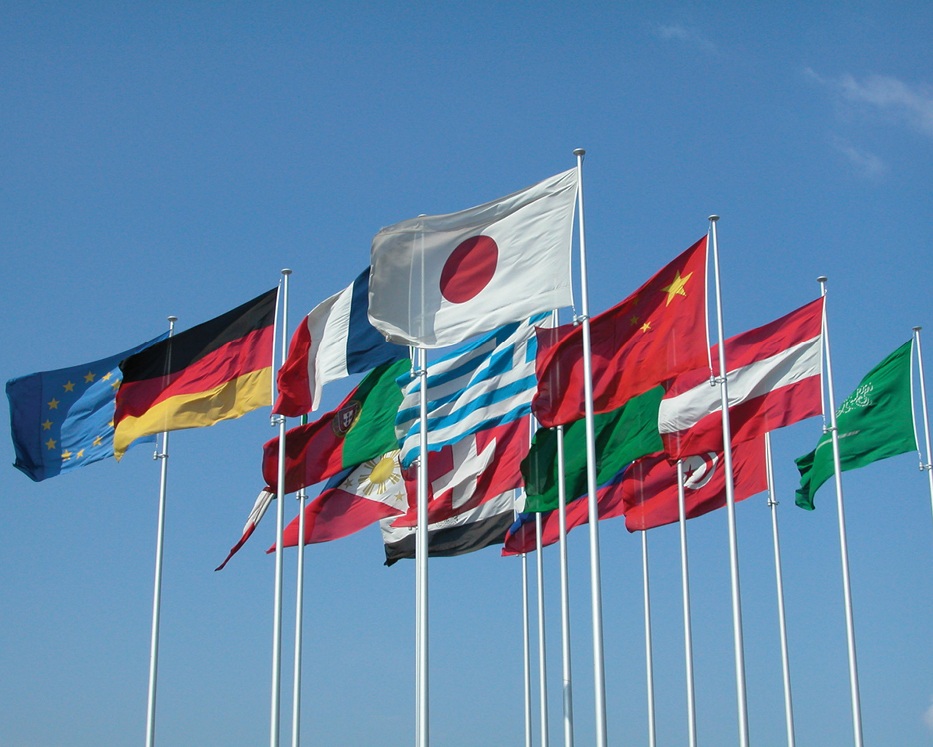Key Takeaways
- The U.N. has delayed a vote on a potential carbon tax system for global shipping.
- The U.S. had strongly opposed the plan, threatening retaliation against countries which supported it.
- Despite the setback, the global push to reduce carbon emissions through new taxes or fines is likely to continue.
- U.N. soon to complete digital tax rules.
- Businesses challenge constitutionality of Trump tariffs.
In another apparent foreign policy victory for the Trump administration, the United Nations International Marine Organization delayed a vote last week on a proposed carbon emissions taxation system for global shipping—strongly opposed by the U.S. and other oil-rich nations—for at least the next 12 months.
The system, called the Net-Zero Framework, would set limits for greenhouse gas emissions for cargo ships, and those above the limit would be required to purchase “remedial units” which could also be saved for the future or transferred to other ships. The trading system bears some resemblance to the European Union’s emissions trading system, which has been in place since 2005. The fines would be administered under the 1973 International Convention for the Prevention of Pollution from Ships, which the U.S. and 158 other countries have signed. Funds raised through the penalties would be used to reward shipping companies with vessels that stay under the limit, although the details of this have yet to be drawn out.
Aside from leaving the discussions, the U.S. has threatened to retaliate against countries supporting the proposal—including higher port fees, blocking vessels entirely, increased visa restrictions and even “sanctions” against government officials who’ve pushed the plan.
The shipping industry comprises a significant portion of overall greenhouse gas emissions—according to some estimates, as much as 3%. But the proposal is probably even more important as a precedent, as potentially the first major global carbon tax put into place. (Although many countries have enacted carbon taxes at the national level.)
But while this vote could be seen as a victory for carbon tax opponents, it’s not likely to reverse the overall global interest in enacting new taxes on carbon emissions. The EU is moving ahead on its carbon border adjustment mechanism, a tariff on selected products in carbon-intensive industries, based on the estimated emissions embedded into the import. The CBAM is set to take full effect next year, despite threats from the Trump administration to enact retaliatory tariffs.
And while the U.N.’s proposed carbon tax on shipping has been delayed, it hasn’t been completely rescinded—and the global picture may change within the coming months.
Noteworthy Items This Week
The outcome was in part the culmination of a months-long campaign by US officials — including diplomats and cabinet members as well as the president himself — to fight the fee they decried as an untenable global carbon tax.
“President Trump saved America from the outrageous climate scam that was killing our country, and he has long warned others to abandon this destructive agenda before it is too late,” White House spokeswoman Taylor Rogers said by email. “Stopping this disastrous vote is a massive win for the American people and countries around the world that cannot afford to bend the knee to bogus climate demands any longer.”
French Digital Tax Ruling Puts Spotlight On Trade Tensions – Natalie Olivo, Law360 Tax Authority ($):
The legality of digital levies, whether in France or elsewhere in Europe, is of little consequence to Trump, who has been after DSTs since his first administration, according to Daniel Cannistra, a partner in Crowell & Moring LLP's Washington, D.C., office.
"Europe doesn't have much to offer Trump because their tariffs are already pretty low," he said. "So this is going to become one of those things that they could offer."
UN Panel Aims to Set Model Rules for Taxing Virtual Business – James Munson, Bloomberg Tax ($):
The committee, meeting this week in Geneva to develop its agenda for the next four years, will work on the new rules by updating sections of the UN’s model tax convention. Developing countries use the model convention as a template to draft legislation and negotiate tax treaties.
A new subcommittee will focus on updates to the convention, including the new nexus rules, and act as a coordinating body to delegate topics best left to other subcommittees, said committee Chair Mathew Gbonjubola.
Trump’s Tariffs Are Unconstitutional, Challengers Tell SCOTUS – Caitlin Mullaney, Tax Notes ($):
In its October 20 response brief in Learning Resources Inc. v. Trump, Learning Resources Inc. contended that IEEPA’S authorization for the president to regulate importation doesn't give Trump the authority to impose the tariffs that he has used to “rewrite U.S. trade laws and reshape the national economy.”
Public Domain Superhero of the Week
Every week, a new character from the Golden Age of Comics, who’s fallen out of use.
This week’s entry: The Black Bull
/arrow/blackangel/black_angel2/capt-triumph/wizard/duke_of_darkness_003/blackbul111.jpg)
Debut Year: 1948
Debut Publication: Prize Comics Western #71
Origin Story: The Black Bull is the alter-ego of a wealthy cattle baron's son, who secretly fights scoundrels in the tradition of Zorro, the Lone Ranger, and other masked heroes of the frontier.
Superpowers: No superpowers, but he's a great shot with a loyal horse.
Eide Bailly's International Tax Team and our affiliates at HLB, The Global Advisory and Accounting Network, stand ready to assist with your worldwide tax needs.
Make a habit of sustained success.



